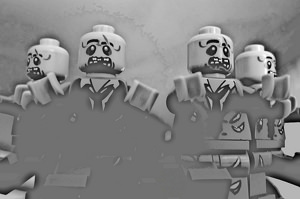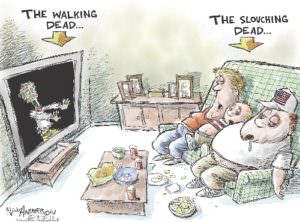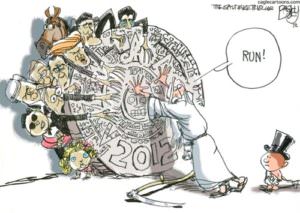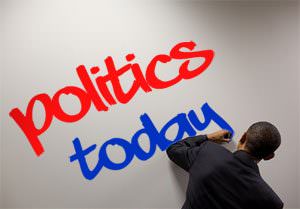Politics and Our Zombie Fixation
Zombies have figured prominently in the American cultural spotlight for at least a decade. Might the phenomenon have anything to do with, say, many Americans' feeling of alienation from the nation’s political life?
Zombies have figured prominently in the American cultural spotlight for at least a decade. Might the phenomenon have anything to do with, say, many Americans’ feeling of alienation from the nation’s political life?
The Zombie apocalypse depicted in video games, television and on the big screen shows us a world entirely beyond our control, producing a feeling of helplessness akin to what one likely feels in the face of sustained unemployment, a growing student debt bubble, a life spent performing tasks that have nothing to do with the lessons learned in college, a stagnant minimum wage, near limitless profits for the super-rich and interminable imperial wars, etc.
Given that litany of desperate scenarios, why not embrace the madness? Surrender yourself at the theater where your nihilism is played out before your eyes, or join a flash mob or street parade full of your fellow walking, talking, living dead.
— Posted by Alexander Reed Kelly. Follow him on Twitter: @areedkelly.
This report originally appeared at AlterNet.
Your support matters…Kristin Rawls at AlterNet:
A year ago, a CBS poll suggested that, “Americans have long felt they have little say in government. But the trends are troubling: While 58 percent said they have little say in what government does in 1990, that figure has risen to 69 percent today. In the new survey, 85 percent say that people like them had too little influence on American life.”
Political alienation in the United States, in other words, has never been higher. A staggering 85 percent of Americans did not feel that American politics allowed them much in the way of participation.
It’s really no wonder that American popular culture has taken a turn toward the grim. Maybe zombies sell these days because, not unlike the sort of nuclear apocalypse tales that resonated throughout the Cold War, they posit an outside threat, a menace beyond the control of regular people. And maybe there are more feelings of futility now than there were then, even as anxieties about nuclear holocaust loomed.
Independent journalism is under threat and overshadowed by heavily funded mainstream media.
You can help level the playing field. Become a member.
Your tax-deductible contribution keeps us digging beneath the headlines to give you thought-provoking, investigative reporting and analysis that unearths what's really happening- without compromise.
Give today to support our courageous, independent journalists.





You need to be a supporter to comment.
There are currently no responses to this article.
Be the first to respond.